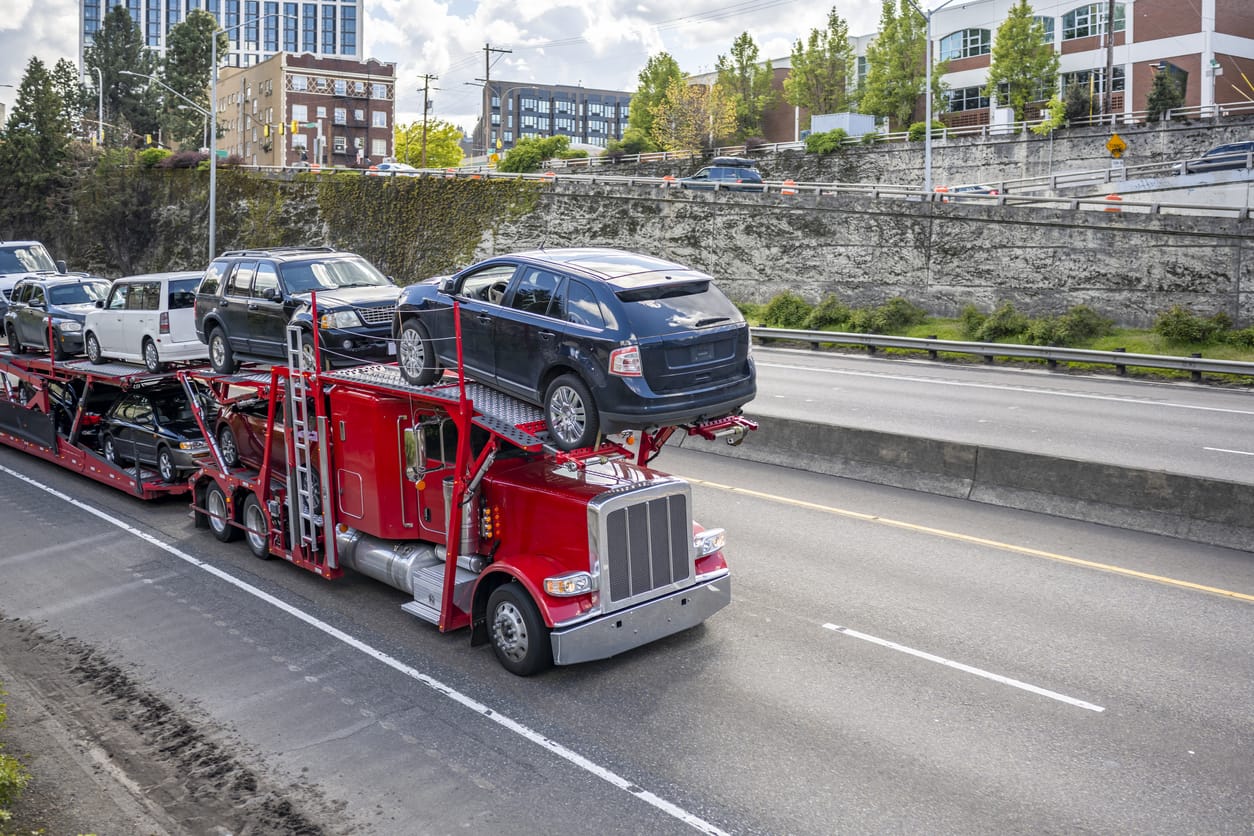Auto shipping across the vastness of the United States is like seeing a well-rehearsed ballet unfold. The goal of meticulous planning is to deliver cars from coast to coast without any hiccups. Even with the best practiced performances, unforeseen setbacks can happen. It is not only helpful, but necessary for anybody wanting to ship their car to understand the beat of potential delays in this complex dance. Auto transporters travel more than 100,000 miles annually, traversing the nation’s varied landscapes, which range from the sun-drenched lowlands of California to the snow-capped peaks of the Rockies. Their perseverance and commitment ensure that your vehicle reaches its destination and keep the wheels of the auto transport business turning.
The road is not always easy, though. What happens when unanticipated difficulties bring the smooth transportation system to a halt and the music stops? This blog article explores the typical causes of car shipping pauses, providing insight into the unpredictability of vehicle transportation. Whether it’s the fury of the elements, technical malfunctions, or administrative obstacles, every element has a substantial impact on the transportation process as a whole. We want to provide you a clear picture of what to anticipate throughout the car shipping process by examining these possible delays. This will help you stay aware of the reality of automobile transport in the United States.

Starting the process of moving a car across the sprawling states of the United States is a huge undertaking, similar to negotiating a maze of obstacles both visible and invisible. A committed group of drivers, vehicles, and logistical planners work behind the scenes to coordinate every step of this logistical dance, making sure the travel goes as smoothly as the open road permits. However, even with the careful planning and experienced guidance, the journey is unpredictable. A handful of uncontrollable elements, such as the unpredictable behavior of nature or the fickleness of technology, loom big and threaten to cause unanticipated delays in the carefully planned performance. The next sections illuminate the primary offenders and offer an insight into the plethora of roadblocks that may impede the voyage, underscoring the constant necessity of adaptability and fortitude in the face of the uncertain path ahead.
The equipment in the complex world of car transport creates its own distinct symphony, which frequently determines the speed and direction of vehicle shipments. This section explores the typical technical and mechanical problems that might upset this balance and cause delays and deviations in the transportation process.
The Unavoidable Breakdown: Vehicles are not meant to live forever, and the trucks that form the backbone of the car transport business are no different. Drivers and businesses deal with the inevitable breakdown on a daily basis. After thousands of kilometers on a variety of surfaces, these vehicles finally give in to the rigors of their unyielding schedules. When a breakdown happens, it’s usually the result of a difficult and drawn-out repair procedure requiring specific knowledge and components, rather than just a straightforward matter of changing a tire or topping off fluids. This might cause a substantial delay in transit times since it can be difficult to find a repair facility that is capable of handling such massive and complex vehicles.
Technological Hitches: Modern trucks are outfitted with a plethora of cutting-edge features and technology designed to increase productivity, safety, and adherence to strict laws. These developments, meanwhile, can have unintended consequences that result in “technological hitches.” The irony is that these more recent models, which are supposed to improve performance and minimize downtime, are capable of experiencing more difficult-to-diagnose and repair problems than their more traditional counterparts. These technical hiccups, which can range from software errors to sensor malfunctions, not only need to be fixed by experts but also frequently cause the vehicle to be off the road for long periods of time, which affects delivery schedules and causes unexpected delays in the auto transport process.

It is impossible to overestimate the impact of weather on auto transport, since each season presents unique difficulties. This section examines the ways in which extreme weather—from the searing summer heat to the biting winter cold—affects vehicle transportation schedules and safety.
The Wrath of the Elements: The unpredictable mood swings of Mother Nature pose a serious threat to the vehicle transport industry, since they have the ability to cause delays and compromise security. The intense heat waves that accompany the summer may strain vehicles and drivers to the breaking point, increasing the danger of mechanical breakdowns and engine overheating. Conversely, winter poses its own challenges, with icy roads and bone-chilling blizzards producing dangerous circumstances that can completely stop transportation. In addition to a high degree of readiness, these extreme weather circumstances necessitate flexibility in logistics planning in order to manage the unpredictability of the impact on transportation schedules and guarantee the security of the cargo and those entrusted with its delivery.
In order to guarantee a flawless delivery procedure, every component in the complex network of timetables, routes, and obligations that makes up the world of vehicle transport logistics must line up precisely. This section emphasizes the careful balancing act needed to coordinate various components as well as the effects of unforeseen events, such cancellations, on the overall harmony of logistics.
Unexpected Cancellations: Cancellations can cause disruptions to even the most well planned trip, highlighting how delicate logistical coordination is in the vehicle transport industry. These cancellations may occur from various sources, often involving other companies whose vehicles were scheduled for the same transport. Every car is a component of a meticulously put together jigsaw for the auto carrier, covering several clients and locations. Unexpected removal of one component might upset the entire structure, requiring a quick, frequently intricate rearrangement to close the space. In order to maintain efficiency and fulfill delivery obligations, the carrier may need to realign their timetable, procure new cargo, or reroute the trip, which might result in delays. These interruptions serve as a reminder of the car transport industry’s interdependence and the difficulties businesses encounter in preserving a steady operating flow in the face of changing customer demands and outside variables.

Human interaction has a significant impact on the car transport process and is not just dependent on machinery. The drivers who are the backbone of the business have a unique set of difficulties that go beyond the technical and administrative demands of their jobs. This section explores how individual situations, such illness or family issues, might affect the efficient operation of vehicle transport, highlighting the human frailties that can cause unforeseen delays.
Illness and Family Emergencies: Even the most experienced vehicle transport drivers might become unwell at any time or receive an urgent call regarding a family issue. These urgent personal problems frequently cause drivers to divert from their obligations and routes. When a driver is forced to step back from their duties, the ripple effects are felt across the logistical chain, prompting reassignments of loads, delays in delivery schedules, and a scramble to cover routes. The delicate balancing act between the personal and professional lives of people who drive the auto transport industry’s wheels is brought to light by these disruptions. Transport companies and their clients are reminded of the importance of human interaction in ensuring the dependability and effectiveness of car shipping services when they acknowledge these problems.

The efficient operation of vehicle shipping goes beyond the routes taken and the circumstances encountered; it mostly depends on the cadence established by the recipients. This section examines the critical roles that customers’ response and availability—or lack thereof—play in the prompt pickup and delivery of cars, which in turn affects the overall efficiency of the transportation process.
The Impact of Availability: The recipient comes into focus as the transit journey draws to an end, and their preparedness to accept the delivery becomes the last, crucial piece of the logistical jigsaw. A ready and waiting recipient and a smooth handover guaranteeing the car’s prompt transfer from transporter to owner are the perfect situation. The actual situation, however, is frequently more nuanced, with missed appointments and schedule difficulties potentially adding time to the process. Each lost connection affects not just the delivery at hand but also the transporter’s future timetables, affecting shipments and other clients farther down the line. Because of the interdependence of the auto transport ecosystem, recipients have a substantial impact on delivery success and timeliness, which emphasizes the significance of effective communication and coordination between all parties involved.

It takes more than simply the open road to navigate the organized world of vehicle transport; one must adhere to a stringent system of rules and guidelines intended to guarantee safety and responsibility. This section explores how scheduling and operational efficiency are impacted by the crucial yet time-consuming aspect of vehicle transport logistics—the inspections and weigh stations required to comply with Department of Transportation (DOT) requirements.
Inspections and Weigh Stations: Mandatory checkpoints are places along an auto transporter’s route where vehicles are inspected for conformity with DOT standards. These weigh station visits and inspections are more than just formalities; they are crucial steps in ensuring the health of the drivers, the safety of the transportation process, and the condition of the vehicles. However, the transporter’s capacity to complete the daily miles may be severely impacted by these necessary stops, which might result in delays. Even while every inspection is necessary to uphold strict standards of road safety, it takes time away from moving closer to the delivery location. Transporters always have to strike a balance between efficiency and compliance, which calls for careful planning and cooperation to reduce delays.
Navigating Delays and Detours: Customers may travel with the patience and perspective that are required during the vehicle shipping process if they have a complete awareness of the intricate causes behind transport delays, including the time spent at compliance checkpoints. Setting reasonable expectations can be aided by acknowledging that these disruptions, albeit being inconvenient, are necessary to guarantee the security and legitimacy of the transportation service. Furthermore, by having this knowledge, clients and their transport companies can plan and communicate more effectively, which makes it easier for everyone to comprehend and negotiate the regulatory rhythms and checkpoints. In addition to stressing the necessity of cooperation in order to effectively handle the logistical difficulties brought on by regulatory requirements, it emphasizes the significance of compliance in the greater scheme of guaranteeing prompt and secure vehicle delivery.

The world of driving across the vast American landscapes is like trying to navigate a river full of unexpected currents and whirlpools. The trip is dynamic and unexpected because of mechanical breakdowns, Mother Nature’s whims, logistical ballets, and the very human factors of illness and emergency. However, it is precisely this unpredictability that draws attention to the need for resilience and adaptation on the part of both the clients who entrust them with their precious cars and the people who oversee and manage these transport services. The convoluted and winding route to delivery is littered with obstacles that call for tolerance, comprehension, and a proactive attitude toward preparation and correspondence.
Customers are more prepared for the journey ahead when they are aware of possible delays and the intricacies that characterize the vehicle transport industry. By bridging the gap between expectations and reality, this illumination promotes a connection between consumers and transport services that is built on openness and trust. In the end, the unpredictable trip of car transport is a monument to the human ability to adapt and persevere. While car transport is rarely a straight line, it can be navigated with the correct information and planning, so let’s approach this voyage with an informed viewpoint and a willingness to negotiate its curves.

Ship A Car, Inc. stands out as the industry leader in the intricate world of auto shipping logistics because of its consistent dedication to dependability, openness, and unmatched customer service. SAC is not only a reliable partner but also a service provider with an impressive track record that is demonstrated by its stellar five-star evaluations and prestigious A+ rating from the Better Business Bureau (BBB). This acknowledgment is proof of SAC’s commitment to skillfully and graciously handling the many obstacles faced by the business. Choosing Ship A Car, Inc. is making the decision to travel a path defined by careful attention to detail, honest communication, and a strong dedication to ensuring each customer’s satisfaction—mile after mile. To receive a free quotation with no strings attached, please fill out the vehicle transport calculator right now. Alternatively, you may phone (866) 821-4555 to talk with a transport adviser.
FAQs
Q: Why are auto shipments sometimes delayed? |
A: A number of factors might cause delays, such as mechanical issues, adverse weather conditions, cancellations by other companies or individuals, driver sickness or crises, scheduling difficulties with clients, and compliance inspections at weigh stations. These factors can all contribute to delays.
Q: What strategies does Ship A Car, Inc. employ to deal with these delays?
A: The answer is that Ship A Car, Inc. uses proactive communication, flexible scheduling, and a comprehensive network of trustworthy carriers to manage and reduce delays. This ensures that your vehicle arrives at its destination as easily and quickly as possible.
Q: What makes Ship A Car, Inc. a reliable and trusted choice for auto shipping?
A: With over 12 years of expertise in the business, a dedication to providing excellent customer service, and a proven track record of successfully overcoming the problems that come with car shipping, Ship A Car, Inc. ensures that your vehicle will be in the hands of knowledgeable and trustworthy individuals.




